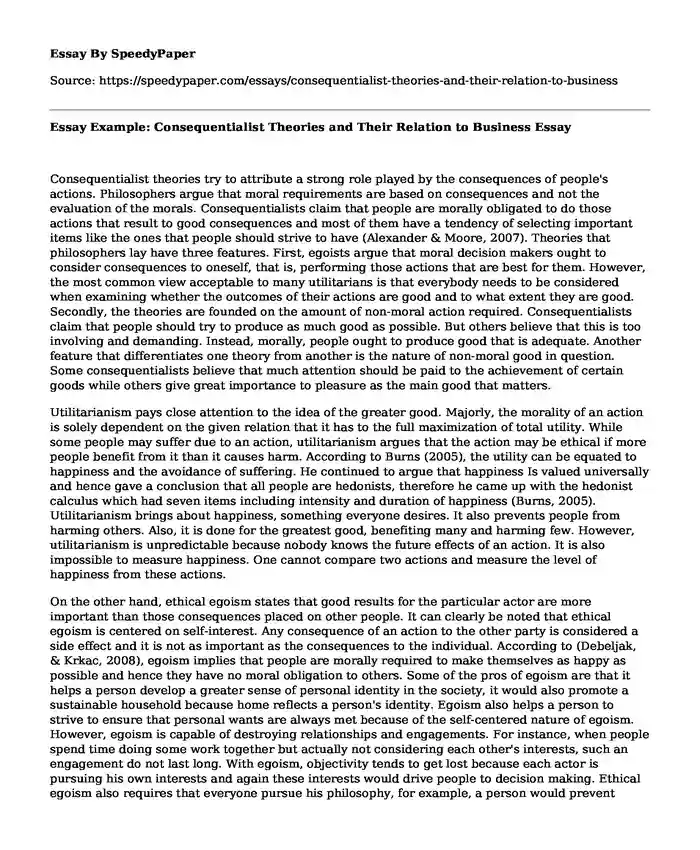
| Type of paper: | Presentation |
| Categories: | Business Philosophy |
| Pages: | 3 |
| Wordcount: | 724 words |
Consequentialist theories try to attribute a strong role played by the consequences of people's actions. Philosophers argue that moral requirements are based on consequences and not the evaluation of the morals. Consequentialists claim that people are morally obligated to do those actions that result to good consequences and most of them have a tendency of selecting important items like the ones that people should strive to have (Alexander & Moore, 2007). Theories that philosophers lay have three features. First, egoists argue that moral decision makers ought to consider consequences to oneself, that is, performing those actions that are best for them. However, the most common view acceptable to many utilitarians is that everybody needs to be considered when examining whether the outcomes of their actions are good and to what extent they are good. Secondly, the theories are founded on the amount of non-moral action required. Consequentialists claim that people should try to produce as much good as possible. But others believe that this is too involving and demanding. Instead, morally, people ought to produce good that is adequate. Another feature that differentiates one theory from another is the nature of non-moral good in question. Some consequentialists believe that much attention should be paid to the achievement of certain goods while others give great importance to pleasure as the main good that matters.
Utilitarianism pays close attention to the idea of the greater good. Majorly, the morality of an action is solely dependent on the given relation that it has to the full maximization of total utility. While some people may suffer due to an action, utilitarianism argues that the action may be ethical if more people benefit from it than it causes harm. According to Burns (2005), the utility can be equated to happiness and the avoidance of suffering. He continued to argue that happiness Is valued universally and hence gave a conclusion that all people are hedonists, therefore he came up with the hedonist calculus which had seven items including intensity and duration of happiness (Burns, 2005). Utilitarianism brings about happiness, something everyone desires. It also prevents people from harming others. Also, it is done for the greatest good, benefiting many and harming few. However, utilitarianism is unpredictable because nobody knows the future effects of an action. It is also impossible to measure happiness. One cannot compare two actions and measure the level of happiness from these actions.
On the other hand, ethical egoism states that good results for the particular actor are more important than those consequences placed on other people. It can clearly be noted that ethical egoism is centered on self-interest. Any consequence of an action to the other party is considered a side effect and it is not as important as the consequences to the individual. According to (Debeljak, & Krkac, 2008), egoism implies that people are morally required to make themselves as happy as possible and hence they have no moral obligation to others. Some of the pros of egoism are that it helps a person develop a greater sense of personal identity in the society, it would also promote a sustainable household because home reflects a person's identity. Egoism also helps a person to strive to ensure that personal wants are always met because of the self-centered nature of egoism. However, egoism is capable of destroying relationships and engagements. For instance, when people spend time doing some work together but actually not considering each other's interests, such an engagement do not last long. With egoism, objectivity tends to get lost because each actor is pursuing his own interests and again these interests would drive people to decision making. Ethical egoism also requires that everyone pursue his philosophy, for example, a person would prevent himself or herself from getting burnt which many people dislike but ethical egoism was in play.
In a business, utilitarianism is best suited than egoism because businesses are driven by defined objective and it is the work of everyone to work towards the set goals. Egoism is too self-centered and can be harmful to business due to the pursuance of individual interests rather than business objective.
References
Alexander, L., & Moore, M. (2007). Deontological ethics.
Burns, J. H. (2005). Happiness and utility: Jeremy Bentham's equation. Utilitas, 17(1), 46-61.
Debeljak, J., & Krkac, K. (2008). "Me, myself & I": practical egoism, selfishness, self-interest and business ethics. Social Responsibility Journal, 4(1/2), 217-227.
Cite this page
Essay Example: Consequentialist Theories and Their Relation to Business. (2022, Sep 21). Retrieved from https://speedypaper.com/essays/consequentialist-theories-and-their-relation-to-business
Request Removal
If you are the original author of this essay and no longer wish to have it published on the SpeedyPaper website, please click below to request its removal:
- Admission Essay Sample for Columbia University SIPA Masters in Public Administration
- Essay Example on Total Hip and Knee Replacement
- Radio in the Current Digital Age, Free Essay in Technology
- Obesity Essay Example from Our Database
- Free Essay Sample on Urban Sprawl
- Essay Example on Karaoke and Comprehension Skills Among Teens cith Learning Disabilities
- Essay Sample on America's Fake News on Political or Social Issue
Popular categories




